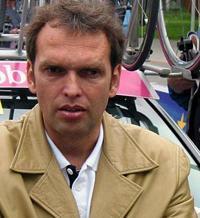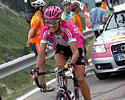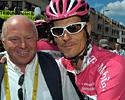
Recently on Cyclingnews.com |
News feature, November 07, 2006
Olaf Ludwig: more questions than answers
 |
Olaf Ludwig is 46 years old, rode professionally for six years (bringing in 50 victories, an Olympic gold medal, the Tour de France sprinter's jersey and a World Cup), and worked in management for T-Mobile Team for an additional ten years, the last year as Team Manager - but all of that came to an end on October 31. "T-Mobile wanted to go in a different direction as far as team management was concerned, they had other ideas, and so the contract was canceled," he said bluntly. How did this all come about? Cyclingnews' Susan Westemeyer spoke with Ludwig about T-Mobile and what went wrong.
After all the problems this year, Ludwig is ready for a short break from pro cycling. He denied rumors that he will be joining another team or even starting his own team. "It is clear that there will be rumors. I have a good relationship with [former team manager Walter] Godefroot. I am not going to Astana and have no plans to start a new team in 2007."
There had been speculation that he would retain T-Mobile's ProTour license and use it to start a new team, but contrary to public perception, Ludwig himself never held a ProTour license. The license for 2005 and 2006 was held by Godefroot, and expires the end of December. Ludwig noted that he applied to the UCI in May 2006 for a license for 2007 - 2010. The UCI's deadline was August 20, and by that date, T-Mobile had changed management over to Bob Stapleton who received the license, leaving Ludwig without a main sponsor.
Even if he wanted to plan a new team, he saw the difficulties. "Things in sport aren't easy, if you were looking for sponsors in August. Right now I'm very disappointed, I need to think about things and take a short break."
Walter Godefroot had run the Telekom/T-Mobile team nearly since its inception, and announced that 2005 would be his last season. He hand-picked Ludwig, then the team's press spokesman, to be his successor, and the two worked together in the 2005 season before Ludwig took over for the 2006 season. Almost immediately after the end of the Tour de France this year, though, sponsor T-Mobile expressed its dissatisfaction with the management and indicated that changes would have to be made. Stapleton, who had managed the T-Mobile women's team, was chosen to take over the team and the position as Team Manager, with Ludwig and Technical Sports Director Mario Kummer being shown the door.
How did things go so badly so quickly? The biggest problems were with certain riders for the spring classics. "Most of my relationships with the team were good, there were things that I wanted to change and I let the riders know that. Some of them couldn't accept the criticism, even some with whom I had always previously gotten along with well," Ludwig noted. "We had two goals going in to the racing year: to start the season well, and the Tour de France. We had some riders who could have done well in the spring, such as Gonchar and Mazzoleni, but we wanted to save them for the Tour. They didn't have any highlights in the spring season and could concentrate on preparing for the Tour, they didn't have to do anything in the spring."
This put pressure on those riders who were expected to do well in the spring, but didn't live up to expectations. "We did have some bad luck with injuries, but the main problem was with those riders who I had criticized, and which they didn't appreciate. Their attitudes weren't what they should have been," he noted.
Ludwig is also willing to name names. "The attitudes in the preparations and then the performances in the races were not satisfactory. The important riders for the first Classics races - Andreas Klier, Serguei Ivanov, and Steffen Wesemann - were not able to fulfill their leadership positions within the team, and also their performances were not top. They always had some kind of excuse. That led to the well-deserved criticism."
This unhappiness apparently festered and spread, reaching its zenith during
the Tour de France. The Tour started notoriously badly for the team when captain
Jan Ullrich and his helper Oscar Sevilla were sent
home because of Operation Puerto.
Andreas Klöden was thus elevated to the captain's role, and Matthias Kessler
became his lieutenant, taking
care of things for Klöden so that he could concentrate on his riding.
"It's things like discussions with the other riders or the directors sportif.
Klödi tells me what he thinks, we discuss it, and then I give his opinion
further. He doesn't have to do it, I take care of it for him," Kessler
said, explaining the growing distance between Klöden and the team management.

|
Klöden ended up claiming third place on the podium in Paris, but wasn't
satisfied. "I would have won the Tour if [Ludwig and Kummer] hadn't been
so incapable," he groused.
Ludwig agreed with only the first part of that statement. "That's right:
Klöden could have won the Tour if he and Matthias Kessler hadn't tried
to follow their own interests. The action in the Pyrenees wasn't planned with
the sporting directors. The riders did that themselves."
After the Tour came the ominous announcement
from the sponsor, and ultimately the takeover of the team by Stapleton.
The sponsor's reasons were "loss of confidence in the management of the
team, as well as important differences of opinion concerning the future direction
of the team, and the problems of doping." Was Ludwig being held responsible
for Ullrich's alleged doping? Was he being punished for saying that he could
imagine Ullrich returning to the team? Was the sponsor tired of having the entire
team's focus for the whole year on Ullrich? The questions remain unanswered,
but Ludwig said, "I'm still convinced that it was right to do things the
way we did, to have everything revolve around Jan. The problems that occurred
were caused by others, not by me."

|
What does he think of Operation Puerto? "You have to say that it is all a joke. It has been a catastrophe for the riders involved, for the teams, for the race organizers and for all of cycling," he said. "The names of 40 or riders were directly made public, but the other 240 were never publicized. Now the individual federations are trying to deal with it. It is a farce."
The biggest problem, he noted, "is the length of time it is taking. This Operation Puerto has shaken cycling to its roots. I am convinced that many parties are interested in having the whole thing explained, but that won't be possible. Everybody wants to do something but they can't." He didn't expect to see Ullrich and Ivan Basso in the ProTour peloton next year. "The teams have established this Code of Ethics, and as long as there are no final decisions, they won't be allowed to ride. "
Looking back at his time as team manager, Ludwig said, "It's sad, but that's the way it is. I still think that the ideas I had with Kummer to build up the team were good, but five or six months just isn't enough time to implement anything." What were those ideas? Actually, they weren't all that different from what the new management is preaching. "We wanted the team to get younger, to concentrate on more races, not just the Tour, and bring back the team spirit and motivation, which were missing," Ludwig said. "Where did we want to go, what would Jan do. He said that he if he won the Tour he would stop riding. That would have made an enormous difference to the team. The Tour is and remains an absolute highlight, but all of that is in the past...."
"These are hard times for cycling, when so many decision remain open. Operation Puerto doesn't make things easier, and there are problems with the ProTour and the race organizers," he concluded. "How will it go in the future, what should the organizer do, decisions have to be made. Can Ullrich and Basso ride again, what is with the ProTour? Some quick answers would help cycling." And the question remains open as to whether Olaf Ludwig will continue to be a part of the future of cycling.
